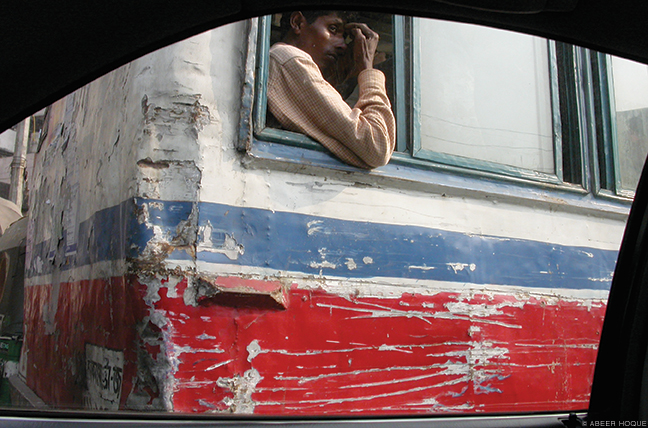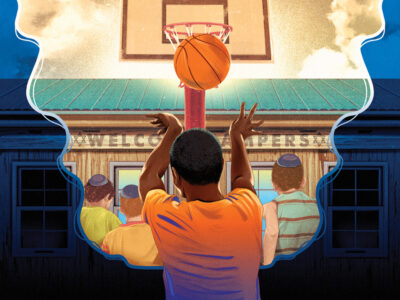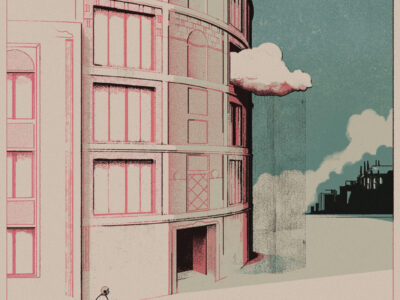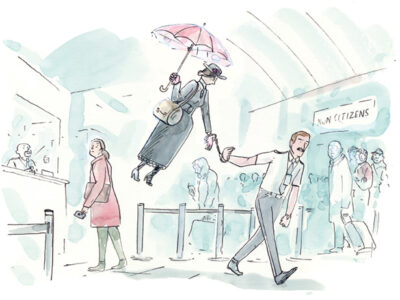
“This is a different Dhaka than I’m used to.”
By Abeer Hoque | I am hurrying through the damp sweating halls of Zia International Airport. I can feel the heat already. My flight was three hours late, but a barrage of cousins and aunts and uncles have been waiting since morning. The baggage claim area of Bangladesh’s main airport is little more than a warehouse. An ancient conveyor belt winds through the center of the room carrying a curiosity shop’s worth of luggage and ware. You’d never guess this was the beginning of the 21st century. My black Samsonite, ordinarily indistinguishable, sits starkly prim in the array. The other bags and boxes are worn and bulging, bound with multi-colored ropes. A row of clear plastic jugs carrying some unknown liquid slides by.
When I turn around, the exit catches my breath. The outer wall is made of glass, fogged with the humid air outside and every viewable inch is crowded with people. Somehow, my relatives emerge from the mosh of waving limbs and craning heads as I walk through the doorways. I am embarrassed that almost none of their smiling faces are familiar to me, but they know exactly who I am. Speaking all at once, they take my hands and bags and sweep me outside.
It’s an even bigger shock to enter the living world that is Dhaka. The air is palpable, the sky a blinding blue. Beggars, young and old, catch onto the edges of the dupatta wrapped around my head, tugging at my free hand. I know that from now on, I won’t have an unobserved moment.
Being the center of gawking attention is only the first of my worries. I have never been connected with Bangladesh. In my family, I am the Nigerian child, born in Igbo-land. I had even called myself an Igbo name, Ngozi, as soon as I knew what names were. This is one of the reasons I can’t quite relate to my father when he talks about roots. His nation is vivid in his voice, despite decades spent living elsewhere. My nationality, my accent, changes with the landscape, with the very weather.
Six of us pile into a dilapidated car. I sit awkwardly on my suitcase, getting a whiff of the potent air. The pollution here is powerful and the trailing edge of winter exacerbates it. Without the rain to tamp them down, shrouds of dirt rise two stories in the air and scatter, an almost beautiful hazed vision. My throat starts to itch.
We career through the streets at great speed. Wide as the roads are out by the airport, they are jammed with overflowing buses, cycle rickshaws, three-wheeled baby taxis, trucks full of anything from bricks to livestock, and other cars like ours: overstuffed, wheezy, oil-dribbling contraptions weaving in and out of the traffic.
The walls of every building are marked with water stains, and through the dust, the lush of the countryside is startling. Even in the dry season, it’s obvious that this is a land of floods.
We pull into a small neighborhood in Uttara, inside Dhaka’s northern city limits, and into a gated compound. In the spilling chaos of baggage and bodies, I find Raan, my two-year-old niece, at my side. She’s watching me, chubby and solemn and curious. Dark eyes, darker skin. I am instantly enamored. The gleaming complexions of my Nigerian classmates are standards of beauty set too long ago to change. Even as I sweep her into my arms, her critical elders are complaining.
“She’s so black! You should use Fair and Lovely on her.” “Don’t let her run around in the sun!” Bangladeshis elevate fair skin. The words for beauty and fairness are used interchangeably. As the older, darker, more serious sibling in the family, my role, growing up, was fixed long ago, as were those of my siblings. I was the smart one. Simi was the pretty one. Maher was the loved and loving baby. Because of the way families brand you, my siblings and I are forever doomed to struggle to display all the other dimensions we might have. Couldn’t I be pretty? Couldn’t Simi be smart? Couldn’t Maher make good on his own? Oh no.
In Nigeria, black skin was tantamount to affirming identity, but lighter skin was rare and revered. The opposite phenomenon prevailed in my high school in Pittsburgh. My classmates would spend hours roasting in the summer sunlight to “get some color.” All these countries obsessed with skin color different from the norm and the natural.
My cousin, Raan’s mother, smiles at me, unmoved by the commentary about her daughter. She married late by Bangladeshi standards, her own dark skin marking her for less, despite a lovely rounded face, delicate pixie-like features and a gentle generous demeanor. I was angry then about her plight and am furious now about the comments about Raan. But how can I start a fight so soon after my arrival, when I don’t even know my place? I hug Raan closer and move into the shade.
The next morning, I wake to the beginning of a siege. The house is clattering with activity. Everyone is home because of a hartaal, a country-wide strike called by the opposition party in protest of the policies of the ruling party’s government. No one is supposed to be on the roads from sunrise to sunset and all businesses and schools have shut down for fear of assault or vandalism.
Sunlight splays on my bed, sliced into paisley shapes by the grills barring the windows. Outside, a lone rickshawallah is plying his trade, ferrying a brave or foolhardy passenger. My lively teenage cousin, Shamayla, bounces into my room, having waited hours for me to wake. She was chauffeured to Uttara last night from the neighborhood of Gulshan where the wealthy and the foreign ensconce themselves.
“It’s Valentine’s Day!” she exclaims. “But the hartaal means we can’t go to school to exchange our valentines.”
I laugh. How and when did Valentine’s Day make it here?
“At least the teachers will be happy,” she continues. “They hate Valentine’s Day. They hate anything western.”
I don’t tell Shamayla I hate Valentine’s Day too, with its chocolate-covered Hallmark packaging. But the holiday is just beginning in Bangladesh, and besides, nothing could or should dissuade a teenager from her romances.
“Maybe this means Valentine’s Day will go on for the entire month,” I tell her. “Or at least until the hartaals are over.”
Sure enough, the hartaals do go on, day after day. We sit at home and wait for the evenings, when we can go outside. At night, Dhaka’s numberless corner stores stand out, lone light bulbs casting shadows everywhere. I could stare at the crammed shelves for hours: Nido tins of powdered milk, Ribena blackcurrant juice, fist-sized batteries, sturdy matchboxes. Anachronistic and faded, the odd years of my childhood are on display.
Shamayla confirms a bit of youthful Bangladeshi life that I had heard about: rampant intoxication among the elite.
“There’s an orgy tonight at this guy’s house,” she says, too casually to mean the word she’s saying.
“What happens at these orgies?” I ask, unable to imagine much sex going on.
“Doping and binging.”
“Which means?”
“People drink, smoke, kiss, you know.”
“Smoke as in cigarettes, or pot?”
“Both. But mostly cigs. Everyone smokes.”
“You too?”
“Not like three packs a day like some people. Just a few when I’m drinking. Some people do heroin too. Wanna go?” she asks eagerly.
“I’d love to, but I promised I’d go to this other party with your parents,” I say with real regret. I’m dying to see the scene. That evening, I accompany Shamayla’s parents to a private party of a high-ranking government official. I’ve grown close to Shamayla’s mother, my accomplished and gorgeous Tilo Aunty. She’s my mother’s cousin, but in the way these things go, her family is as close to me as my own. Plus she delights in western culture as easily as she lives in the east, so I don’t have to explain or edit myself as I do with most others.
It’s funny how this time in Bangladesh differs from the last. More than a decade ago, I came to Dhaka with my mother for the summer, pining and possessed in the way only heartsick twenty-nothing-year-olds can be. This time I’ve come alone, for a year, maybe more, not for a treat or to escape, but to write and take photographs. It’s my own private experiment, no prize or punishment at the end, or perhaps a little bit of both. This lack of tether is a different kind of heartsick.
My aunt and uncle’s Pajero zips through the city, guided by their able driver. After 9 p.m., the roads are clear, though during the day, they are almost impassable. As we pass through Tejgaon on our way to Dhanmondi, there’s a long line of parked rickshaws hinting at a slum nearby. Rickshawallahs are the most numerous of Dhaka’s manual laborers. Their straining bodies fill the streets, night or day, each fare worth a fraction of a meal. The street lamps throw lush sodium light on their decorated hooded cycles. At night, they are chained facing each other in pairs, lovers in lockstep.
By the time we arrive, it’s 10 p.m., but no Dhaka party gets going till late. Dinner sometimes gets served close to midnight. The venue is an enormous maze-like garden behind the host’s mansion. Oil candles line the cobblestone footpaths, and the bushes and trees are adorned with tiny lights. There are candle-lit clearings with plush couches and silk cushions, complete with reclining couples chatting in flawless English. The DJ is playing Western dance music and the dance floor is full. The only sign that we might be in Bangladesh are the mosquito coils under every tree.
This is a different Dhaka than I’m used to. Most of my family, both from my mother’s and father’s sides, are middle-class. Many of my paternal cousins worked their painstaking way from the village to the city. My maternal grandparents and relatives were educators and professionals, and their children have walked a similar line.
However, Tilo Aunty and her husband are both successful entrepreneurs. Their connections are far reaching and their social calendar always full. This party is squarely in the domain of the wealthy, and the wealthy of developing countries are in a class by themselves. Here are the politicians and the ministers, the entrepreneurs and the generals, the diplomats and even a strain of royalty—the descendants of the last kings of Bengal.
The open bar next to the hasna hena plant catches my attention, even though I’ve heard Shamayla’s stories. If kids are “doping and binging,” then the adults must be too. It’s just that I haven’t ever seen it happen.
Tilo Aunty laughs at my expression, “If you think this is interesting, you should check out Dhaka Club or one of the other private clubs. Some of the members have doctors’ notes that say they must drink alcohol for medicinal purposes.”
“You’re kidding!” I say. “I’d love to see one of those notes. Do you have one?”
“Of course not! No woman can have one. The note basically means you’re an alcoholic. Only men’s reputations can withstand that sort of scandal, if at all.”
I queue up at the bar, but when it comes to my turn, I can’t do it. It feels too strange, too out of place, to be drinking in Bangladesh. I feel like a child again and ask for a Coke, and then four more. I dance with my vivacious aunt and uncle, but mostly, I watch. It’s a sensory treat, the saris, the jewels, the tiny lights in the garden, the sumptuous food, the easy breezy conversations, even that dislocating feeling like I could be anywhere in the world.
Abeer Hoque W’95 WG’99 lives in New York. Reprinted from Olive Witch by Abeer Hoque © 2017 by Abeer Hoque, used with permission from 4th Estate, a division of HarperCollins publishers.




